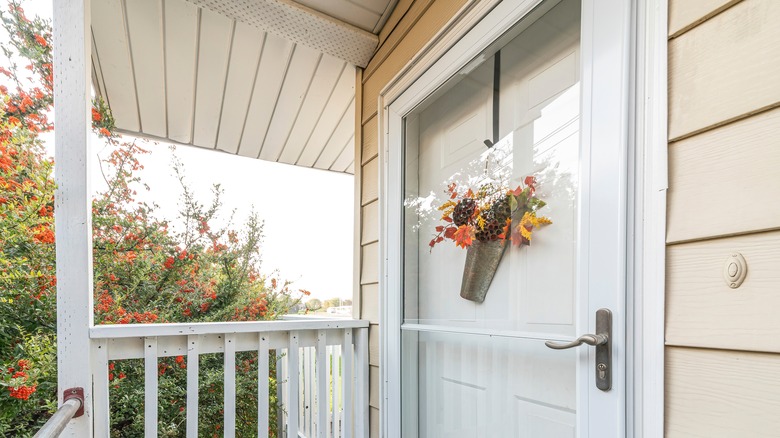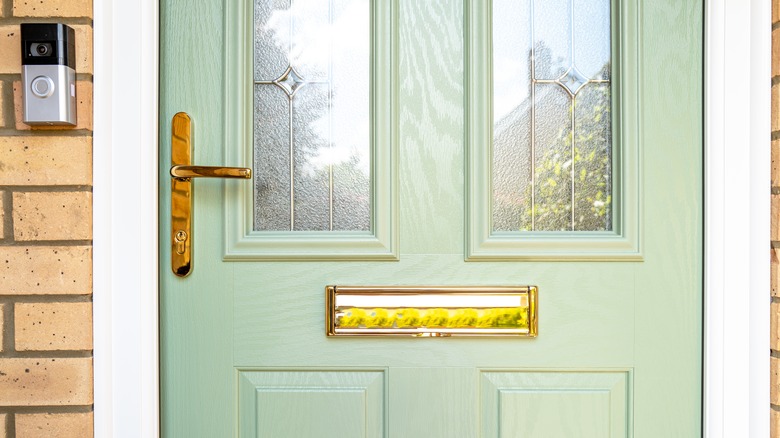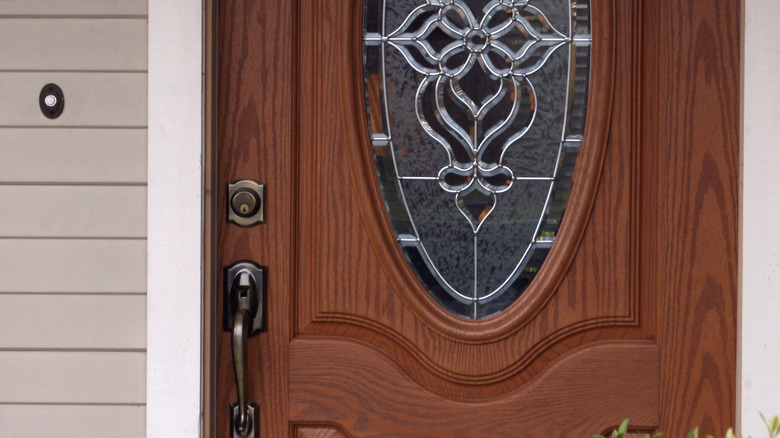Wireless Vs. Wired Doorbells: Which Is Right For Your Home?
Doorbells seem like such a minuscule detail of a home, and yet, it's hard to imagine not having them sing any time someone approaches the door. Electrical doorbells became common for houses in the 1930s, and have rapidly evolved since then.
The 1970s and '80s saw the first battery-operated mechanisms, and by 2012, we were being introduced to doorbell cameras that opened up the world of endless features at our fingertips today. Whether a wireless or wired doorbell, you can now incorporate countless security features such as video, intercoms, and motion detection.
Choosing between a wireless and wired doorbell is tricky, as both will cost you relatively the same price. Most wireless doorbells are commonly priced between $100 to $300 or more, depending on the gadgets you desire, and wired ones are in the same ballpark costing an average of $150 to $200. If your home already has wiring for a doorbell, you can choose either one and still get a straightforward installation.
Wireless doorbells typically work better for houses without wiring already available, as well as the tech-savvy who are looking for extra security options. Wired doorbells fit those who prefer a more traditional approach and a classic and simple aesthetic. Still, as you consider which doorbell works best for your home, carefully consider your needs along with a doorbell's features, style, and installation.
Wireless doorbells
Wireless doorbells are usually chosen for their technical features rather than their looks. While these units might not be the most aesthetically pleasing, you can shop different styles, and they offer countless accessible features that more than makeup for their clunky appearance.
More or less, wireless options will be a sleek box, known as the transmitter, that attaches by adhesive outside your front door. The transmitter sends radio waves to the inside speaker — the receiver. It eliminates all electrical wiring and requires no tools or drilling to set up. Receivers can run on batteries or be plugged into the wall, with batteries typically needing replacement once every two years or so.
Wireless doorbells are often chosen for more than their ringing qualities, but also for security purposes. Options are available that have doorbell cameras, motion sensors, and intercom capabilities that enhance our safety. They can connect to our phones, allowing us to view our visitors even when we aren't home and alerting us through notifications, emails, and texts.
If you are worried that a wireless doorbell won't sound through the entire house, most have a signal range of up to 1,000 feet, and extenders can be purchased for larger properties. You can customize the ringing sounds any time, and assign different tones to different doors. Wireless doorbells are also perfect for those with hearing disabilities, as you can select a flashing light feature in addition to, or instead of, the bell audio.
Wired doorbells
Wired mechanisms work via wiring that runs through the wall, connecting the inside speaker to the outside button. You'll need to hook the indoor wires to a transformer near a circuit breaker to ensure adequate voltage, but at least you won't have to deal with pesky batteries. The installation process is naturally more invasive than wireless, requiring small drill holes to connect wiring. It can seamlessly be patched up, and it's best to call an electrician if you don't have electrical experience.
Wired doorbells are a more subtle and integrated system that blends in with your home décor and can become an accessory with different ornate styles available. They provide simplicity and consistency with a chime that won't change. However, if desired, the front and back doors can still have different sounds.
With wireless options, you may run into signal interference with neighboring homes that have electronics on the same channel. While this can be mitigated, it's not something you'll have to worry about with a wired setup. You can still have cameras and motion detectors on wired doorbells, but they do take longer to install, and are often pricier. It's much simpler to purchase a wireless version if you want those features.
Overall, a wireless doorbell will be easiest if you're looking for smart capabilities and extra security. That being said, a wired doorbell is an excellent option for those seeking to keep it simple and not worry about all the complexities of technology.


